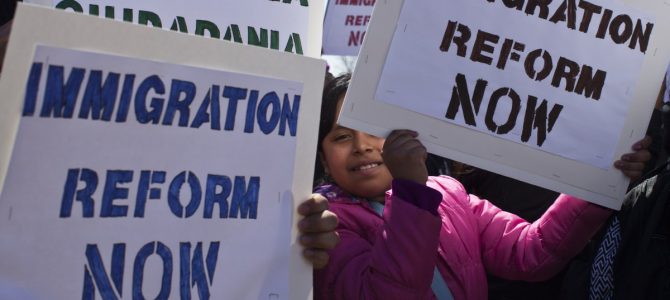
Reforming the U.S. immigration system seems to be a priority for both the president-elect and Congress as the new administration takes over. That’s for good reason. The U.S. immigration system could be improved in many ways to make it align with the interests of American citizens. If promoting the interests of Americans is one of the goals of immigration policy, then reform is long overdue.
But not all efforts towards reform comprise reform. Consider, for example, the recent proposed legislation by Darrell Issa, a Republican congressman from California. Issa wants to tighten the rules for hiring workers under the H1-B visa program. Among other things, the proposed legislation would increase the minimum required yearly wage for workers in the program from $60,000 a year to $100,000 a year. It would also remove a provision in the law that makes it slightly easier for people with masters or higher degrees from the U.S. to obtain an H1-B visa.
Issa says this will protect American workers from foreign competition: the bill “will ensure that our valuable high-skilled immigration spots are used by companies when the positions cannot be filled by the existing workforce.”
Skilled Workers Increase Other Americans’ Wages
Issa’s bill, however, is terribly misguided. It ignores the fact that immigration need not be thought of as a zero-sum game. Issa’s thinking assumes that if an immigrant gets a job in the United States, it means one less job for Americans. Jobs, as well as wealth, can be created by good policies and the availability of human resources. There is no fixed stock of wealth or jobs that must be distributed by some central planner. Fiscal conservatives, of all people, should understand this.
This observation is borne out by the research. In a recent study, the economist Giovanni Peri and his collaborators have found that an increase in foreign STEM (science, technology, engineering, and mathematics) workers by 1 percent of the total U.S. workforce would lead to to an increase in the wages of American workers. The wages of college-educated workers would rise by 7 to 8 percent, and those of non college-educated workers rise by 3 to 4 percent. This means skilled STEM workers benefit Americans by increasing wages, and particularly college-educated workers.
Moreover, the study finds that denying H1-B visas actually costs American workers jobs. For every five H1-B visas denied, one American computer-related worker loses his or her job. This illustrates the flaws in Issa’s thinking. The zero-sum approach to immigration policy simply does not hold up to the research on the issue.
All Immigration Is Not Equal
This is not to say that all immigration is beneficial to America. A newly released National Academy of Sciences report has calculated the fiscal effects of immigration within various categories. According to the report, the fiscal benefits of immigration decrease with immigrants’ age, and increase with education. Young, highly educated immigrants are an enormous fiscal boon. They pay much more in taxes over their lifetimes than they receive in benefits. Older immigrants, and those with low levels of education, on the other hand, pay less in taxes than they receive in benefits.
Moreover, the report explains, the children of immigrants with high levels of education tend to be highly educated as well. The children of immigrants with lower levels of education end up being relatively less educated. Thus, the economic impacts of immigration carry on for generations, depending on the characteristics of the immigrants admitted.
In light of this, it is in Americans’ best interests to create an immigration system that prioritizes young, educated immigrants who are able to create wealth, jobs, and opportunities. Therefore, proposals to cut back on skilled immigration, like the one Issa proposes, are about as counterproductive as you can get.
Right Now Our Immigration System Is Backwards
The current system does not prioritize skilled immigration. Only about 15 percent (the percentage varies slightly, year to year) of legal permanent residencies, or “green cards,” are given based on employment. Thus, only a small fraction of green cards are sensitive to the needs of the American labor market.
The rest of the quota is filled through family-based immigration, refugee programs, and the Diversity Visa Lottery program. These programs have minimal age or education requirements. Family-based immigration policies, for example, currently allow for U.S. citizens to sponsor their parents. Moreover, the regulations put parents (along with spouses and children) at the front of the queue. Hence, parents of U.S. citizens are able to receive green cards more or less immediately.
A STEM worker with a graduate degree from the United States, on the other hand, has to wait much longer. Chinese and Indian STEM workers can face a wait time of 10 years or more! An elderly, poorly educated parent of an American is thus given a huge priority over the kinds of immigrants that can benefit the U.S. economy and create jobs.
This is not to say that parents of U.S. citizens should not be allowed to move to the country. But it goes to show that within an immigration system that already prioritizes family-based visas it makes little sense to cut employment-based immigration further.
Congress is right to make immigration a key policy agenda for the future. But if the goal is to benefit U.S. workers and the economy, legislators should aim to increase, not decrease skilled immigration. There are many other places to make cuts, such as family-based programs (is it obvious that Americans should be able to sponsor their siblings?) or the Diversity Lottery system.
Cutting back on the H1-B program is thus a terrible idea. The program serves as a way (in many cases, the only way) for skilled immigrants who are applying for or receiving green cards to stay in the United States. By scaling back the program, Congress would be making the U.S. immigration system even worse for the American people than it already is. Instead, Congress ought to find ways to pass legislation that makes it easier, not harder, for young, highly educated immigrants to remain the country and create jobs for American workers. It’s just not a zero-sum game.









